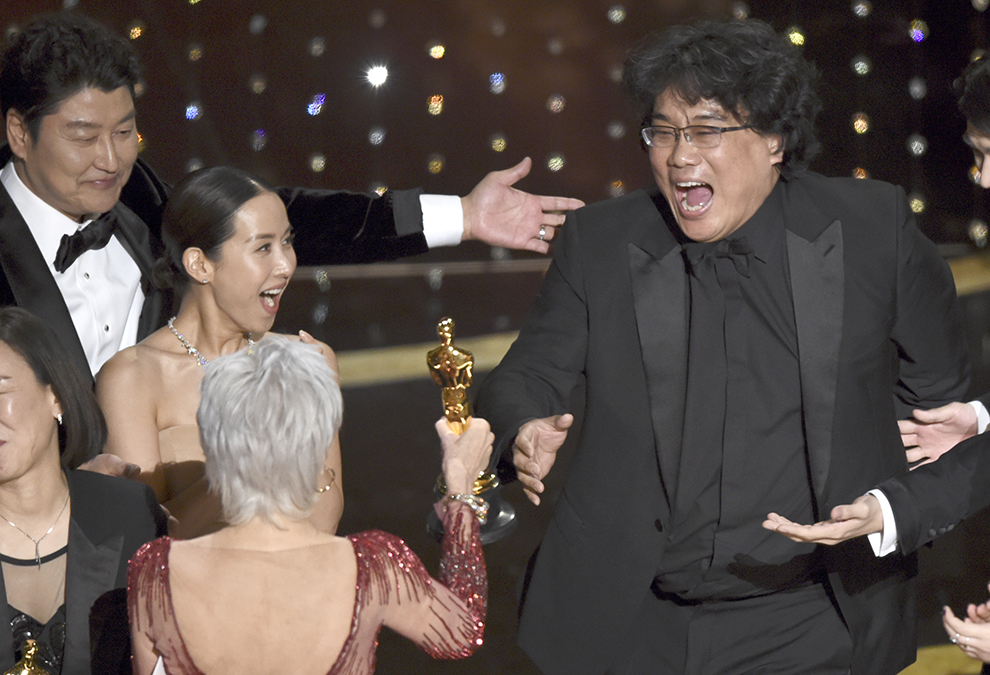By JAKE COYLE

Bong Joon Ho (right) reacts as he is presented with the award for best picture for “Parasite” from presenter Jane Fonda at the Oscars on Feb. 9. Looking on from left are Kang-Ho Song and Kwak Sin Ae. (AP Photo/Chris Pizzello)
LOS ANGELES (AP) — In a milestone win that instantly expanded the Oscars’ horizons, Bong Joon Ho’s masterfully devious class satire “Parasite” became the first non-English language film to win best picture in the 92-year history of the Academy Awards.
“Parasite” took Hollywood’s top prize on Feb. 9, along with awards for best director, best international film and best screenplay. In a year dominated by period epics—“1917,” “Once Upon a Time … In Hollywood,” “The Irishman” —the film academy instead went overseas, to South Korea, to reward a contemporary and unsettling portrait of social inequality in “Parasite.”
True to its name, “Parasite” simply got under the skin of Oscar voters, attaching itself to the American awards season and, ultimately, to history. The win was a watershed moment for the Academy Awards, which has long been content to relegate international films to their own category. But in recent years, to diversify its membership, the Academy of Motion Pictures Arts and Sciences has invited many more overseas voters.
Multiple standing ovations greeted Bong’s several wins. “I am ready to drink tonight,” Bong said, prompting roars from the crowd. Unexpectedly called up again for best director, Bong saluted his fellow nominees, particularly Martin Scorsese, and concluded: “Now I’m ready to drink until tomorrow.”
After the Dolby Theatre had emptied out, the “Parasite” team still remained on the stage, soaking in their win. Backstage, Bong was still gobsmacked. “It’s really f—ing crazy,” he told reporters, clutching his awards.
 The victory for “Parasite”—which had echoes of the surprise win by “Moonlight” over “La La Land” three years ago— came in a year when many criticized the lack of diversity in the nominees and the absence of female filmmakers. But the triumph for “Parasite,” the Palme d’Or-winner at last year’s Cannes Film Festival, enabled Hollywood to flip the script and signal progress, nevertheless. No Korean film had ever won an Oscar before.
The victory for “Parasite”—which had echoes of the surprise win by “Moonlight” over “La La Land” three years ago— came in a year when many criticized the lack of diversity in the nominees and the absence of female filmmakers. But the triumph for “Parasite,” the Palme d’Or-winner at last year’s Cannes Film Festival, enabled Hollywood to flip the script and signal progress, nevertheless. No Korean film had ever won an Oscar before.
There were milestones beyond “Parasite.” In winning best adapted screenplay for his Nazi satire “Jojo Rabbit,” the New Zealand filmmaker Taika Waititi became the first indigenous director ever to win an Oscar. He dedicated the award to “all the indigenous kids in the world who want to do art, dance and write stories.”
“We are the original storytellers,” Waititi said.
“Joker” composer Hildur Guðnadóttir became only the third woman to ever win best original score. ”To the girls, to the women, to the mothers, to the daughters who hear the music opening within, please speak up,” said Guðnadóttir. “We need to hear your voices.”
Awards were spread around to all of the best picture nominees, with the lone exception being Scorsese’s 10-time nominee “The Irishman.” When Bong mentioned his admiration of Scorsese, an impromptu tribute broke out, with the Dolby Theatre giving Scorsese a standing ovation.
All of the acting winners—Brad Pitt, Renée Zellweger, Joaquin Phoenix and Laura Dern—went as expected.
While Pitt, notching his first acting Oscar, had regaled audiences with one-liners in the run-up to the Oscars, he began his comments on a political note.
“They told me I have 45 seconds to speak, which is 45 seconds more than the Senate gave John Bolton this week,” Pitt said, alluding to the impeachment hearings before mentioning director Quentin Tarantino. “I’m thinking maybe Quentin does a movie about it.”
Pitt said the honor had given him reason to reflect on his fairy-tale journey in the film industry, going back to when he moved to Los Angeles from Missouri. “Once upon a time in Hollywood,” said Pitt. “Ain’t that the truth.”
Zellweger completed a comeback, winning her second Academy Award for her fragile but indomitable Judy Garland in “Judy.” Dern won for her performance as a divorce attorney in Noah Baumbach’s “Marriage Story.” Accepting her first Oscar, Dern thanked her in-attendance parents, “my legends, Diane Ladd and Bruce Dern.”
Phoenix, long one of Hollywood’s most respected actors, took best actor for his limber but morose Joker. In his acceptance speech, Phoenix spoke deliberately about a host of issues, including sexism and racism in the film industry, ecological disaster and vegetarianism.
“I’ve been a scoundrel in my life. I’ve been selfish, I’ve been cruel at times and hard to work with. But so many of you in this room have given me a second chance,” Phoenix said. When people guide each other toward redemption, he added, “that is the best of humanity.”
He concluded quoting a lyric of his deceased brother, River Phoenix: “Run to the rescue with love and peace will follow.”
For the 87th time, no women were nominated for best director this year, a subject that was woven into the entire ceremony—and even into some attendees’ clothing. Natalie Portman wore a cape lined with the names of female filmmakers who weren’t nominated for their direction, including Lulu Wang (“The Farewell”), Greta Gerwig (“Little Women”) and Mati Diop (“Atlantics”).



